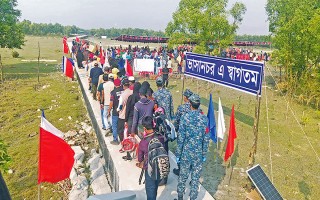Bhasan Char receives 1,642 Rohingyas
A total of 1,642 Rohingya people reached Bhasan Char on Friday afternoon as the government transferred them from the Cox’s Bazar camps to the island amid protests of several foreign rights bodies.
A fleet of 19 vessels, including six navy ships and an army ship, were involved in transferring the Rohingyas, their luggage, security teams and other accompanying people to the island in the Bay of Bengal under the supervision of the Bangladesh Navy on the day, government officials said.
The fleet started from Chattogram Boat Club jetty at about 10:30am for the island, said Chattogram deputy commissioner Md Elias Hossain.
The ships reached the island at about 3.30pm, according to Coast Guard officials.
It was the first phase of transfer as the government was planning to take about 1,00,000 of at least 11 lakh members of the community to decongest the existing camps situated in areas adjacent to borders with Myanmar.
The Bangladesh government on Friday said that the relocation of a section of Rohingya people from the camps of Cox’s Bazar to Bhasan Char island was essential to decongest the camps on security grounds.
‘The relocation has become an imperative as Cox’s Bazar, where Rohingyas have temporarily been accommodated, has become overcrowded while many more thousands are born each year, the foreign ministry said in a press release issued after the first batch of 1642 members of the community reached the island.
The relocation commenced after the Rohingyas expressed their willingness voluntarily, the release said.
As the prolonged stay began to breed frustration among these people in Cox’s Bazar and the security situation deteriorated, the government was compelled to come up with a contingency plan and develop Bhashan Char from its own exchequer, it added.
According to the release, the Bangladesh government invested more than US$350 million to develop the 13,000 acres island with all amenities, uninterrupted supply of electricity and water, agricultural plots, cyclone shelters, two hospitals, four community clinics, mosques, warehouses, telecommunication services, police station, recreation and learning centres, playgrounds, etc.
The island is connected with the mainland through waterways.
In addition to government agencies, around 22 NGOs are already there to extend all possible support to the relocated Rohingyas, the release said.
The foreign ministry expressed hope to engage the UN in the process soon.
The relocation is a part of the broader plan of repatriation which is the only priority for the Government of Bangladesh, said the release.
It also added that the skill development and livelihood opportunity that the Rohingyas would be able to avail in Bhashan Char would prepare them for their reintegration in the Myanmar society upon return.
‘The Rohingyas are Myanmar nationals and they must return to Myanmar,’ the foreign ministry said stating, ‘At this stage, it is desirable that the international community, including the United Nations, fulfil their responsibility and meaningfully engage with Myanmar to begin the repatriation process, which is the only durable solution to the crisis.’
The government also requested the human rights groups to make efforts to create a conducive environment inside Myanmar for their quick, safe and dignified return to their land of origin, Myanmar.
The government has prepared a list of about 4,000 Rohingya people of about 500 families and taken their consent for relocating them from their current place of residence in Cox’s Bazar to Bhasan Char, a senior government official said.
The UN office in Dhaka and several foreign rights groups — Human Rights Watch, Amnesty International and Fortify Rights — requested the government of Bangladesh to confirm a ‘free and informed decision’ of the displaced Rohingyas based on relevant, accurate and updated information before relocating them from camps in Cox’s Bazar to Bhasan Char.
A total of 860,000 Rohingyas, mostly women, children and aged people, entered Bangladesh fleeing unbridled murder, arson and rape during ‘security operations’ by Myanmar military in Rakhine, what the United Nations denounced as ethnic cleansing and genocide, beginning from August 25, 2017.
The latest Rohingya influx took the number of undocumented Myanmar nationals and registered refugees in Bangladesh to over 1.1 million, according to estimates by UN agencies and Bangladesh foreign ministry.
Not a single Rohingya returned to their home in Rakhine as the Myanmar government has almost stalled the Rohingya reparation process resorting to various means, including near discontinuation of clearing of names of the refugees eligible to go back to their homeland and an unwillingness to hold meetings of the bilateral joint working group and the tripartite mechanism led by China.\
News Courtesy: www.newagebd.net











